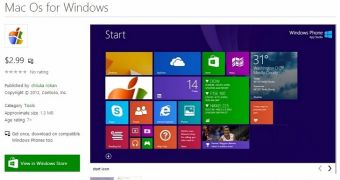The number of apps published in the Windows Store is growing bigger at a very fast pace, but that’s not necessarily thanks to developers who decided to port their programs to Windows 8.
In fact, it’s all because of spam and poor-quality apps that some way or another get Microsoft’s go-ahead to be listed for download, and thus reach the store for users across the world.
We’ve been reporting such spam apps for months and even told Microsoft about them, but even though the company said it would clean the store on the first occasion, it appears that many fake items are reaching Windows 8 app repository every single day.
Today, for example, we have come across three different apps that are using the names of some very popular software solutions which are yet to be launched on Windows 8 or which could sound really appealing for those who are thinking about switching to a different platform.
Candy Crush Saga PC, BBM PC, and Mac OS for Windows are all displayed in the store right now, but the biggest issue is that they’re all available with a small fee, which obviously calls for users to pay for a license before installing them.
Given the fact that they are using very popular names, some might think that they are actually getting the real software, hence the reason Microsoft should try to protect its users and remove such bogus apps.
Here’s the description of “Mac Os for Windows,” which is actually one of the ways to figure out that you aren’t dealing with the official software, but with a fake entry that attempts to steal your money:
“Want To experience Apple's Mac Os On Windows Pc. Try This App , It Gives You a Complete Description Of How To Do It. It Provides You The Steps And Important LInks TO Get The Mac Os Easily.”
In most cases, these apps promise to work on both desktops and tablets running Windows 8 but in fact only want you to pay the small fee to download them without actually doing anything good.
As usual, we’re still waiting for Microsoft’s comments on this but, in the meantime, just try to stay on the safe side and check twice before downloading something that doesn’t seem to be real. If it sounds too good to be true, it’s most likely fake.

 14 DAY TRIAL //
14 DAY TRIAL //